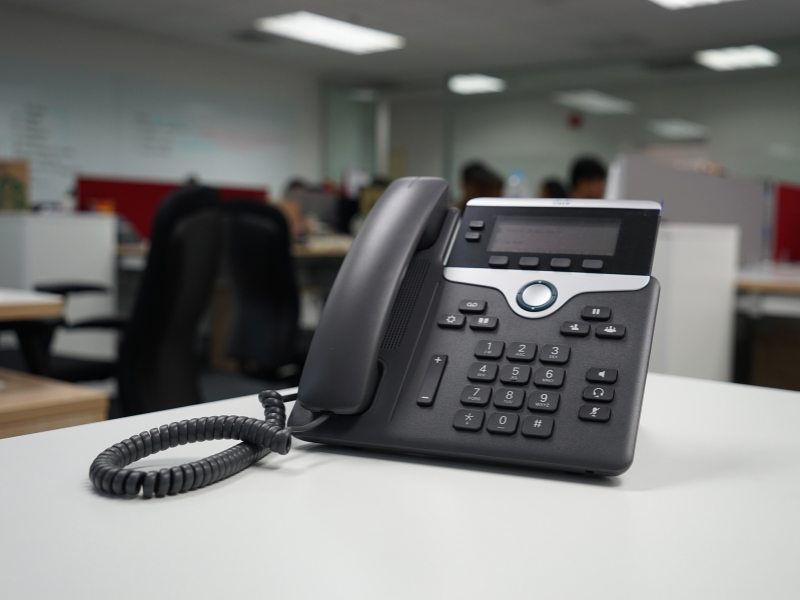What is cloud PBX, and what are its advantages? Many sources highlight cloud PBX’s features, allowing businesses to improve scalability while reducing costs.
This article discusses what a cloud PBX system is and the benefits it can offer in terms of flexibility and communication efficiency.
Table of Contents

What Is a Cloud PBX Phone System?
A cloud private branch exchange (PBX) or cloud-hosted PBX refers to a virtual phone system that is hosted by a third-party service provider in the cloud and utilizes VoIP (Voice over Internet Protocol) technology. It allows you to make and receive calls through the Internet while the phone system itself is taken care of by a service provider. Traditional or legacy phone systems have physical phones connected to a box (PBX) that manages calls. When you replace that box with the Internet, you have cloud PBX.
The definition of cloud PBX is different from that of VoIP digital phone systems. A digital or VoIP PBX can be hosted in the cloud or housed on-site or on-premise in large hardware units. Cloud PBX is strictly hosted in the cloud, moving everything in the virtual space. You don’t need to worry about maintenance because a service provider does that for you.
Advantages of Using a Cloud PBX Phone System
Cloud-based PBX has become increasingly popular, rapidly replacing legacy phone systems. It offers numerous benefits:
Cost-efficient
Cloud PBX eliminates expensive on-site hardware and maintenance. Most service providers offer subscription-based plans, allowing you to pay for what you use without large upfront costs. Moreover, since the price is predictable every month, you can manage communication costs better.
Flexible
More businesses require remote functions, and cloud PBX is highly adaptable in this setup. Your phone lines can be reached anytime and anywhere, regardless of location. You can use mobile phones, desktops, and laptops to communicate and request that calls be routed to different devices.
Scalable
You can request your service provider to add or remove phone lines without physical upgrades. If your business communication grows or fluctuates, a cloud-based PBX can quickly adapt to the situation.
Feature-rich
Unlike traditional phone systems, cloud PBX typically includes numerous communication features. These features include voicemail, auto-attendants, call forwarding, and app integrations, which can help your staff become more efficient and less burdened with administrative tasks.
Easy setup
Quick deployment is one of the main advantages of cloud PBX. You don’t need to wait several weeks or months to install the hardware, configure it, and test if it works. Depending on the provider, you only need to create an account and wait for a few minutes or hours. Typically, you can configure and test the features, such as call routing or extensions, within the day.
How Cloud PBX Phone Systems Work
Now that you know what a Cloud PBX is, it’s time to find out how it works:
Cloud hosting
Instead of having a physical PBX at your office, the entire phone system is hosted in the cloud. Think of the cloud as a virtual space where powerful computers store and manage your phone system.
Internet calls
When you make a call, your voice is converted into digital data. With a cloud PBX, this data travels over the internet to the cloud servers. Instead of relying on traditional phone lines, your calls depend on the internet to reach their destination.
Virtual phone lines
In the cloud, you don’t have physical phone lines. Instead, you get virtual phone lines. These are digital connections that allow you to make and receive calls. A cloud PBX system lets you have as many virtual lines as you need.
Features and settings
Using a web interface, you can control and customize your settings. This includes adding or removing users, setting up voicemail and extensions, creating automated messages, and managing other features.
Automatic updates
The cloud service provider takes care of updates and maintenance. You always have the latest features, security patches, and improvements without doing anything yourself. However, you must still monitor certain aspects like account access and call logs for security purposes.
Choosing the Right Cloud PBX Phone System Provider
Choose a cloud PBX provider that can ensure its services are secure, available, and operational when needed. Any downtime can disrupt business operations that rely heavily on the cloud, resulting in lost productivity, disgruntled clients, and potential revenue loss.
If you serve regulated industries, a cloud PBX service should be able to comply with relevant data privacy regulations such as HIPAA. A good cloud service provider should provide advanced security features, data backups and recovery, risk analysis, and continuous system monitoring.









